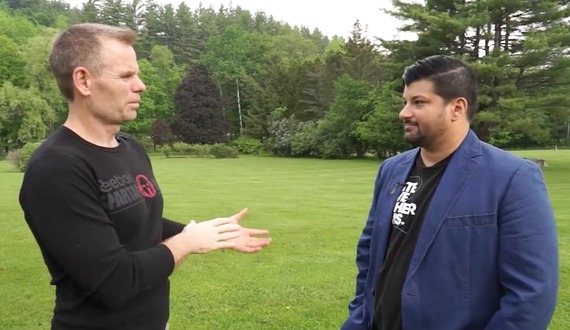Joe Galasso is clinical psychologist who specializes with individuals with disabilities and also with professional athletes. There is a specific part of his job that he holds close to his heart; working with Special Athletes. Most notably, Galasso works with Special Spartans -- Spartan Race's heat dedicated to allowing kids with intellectual and developmental disorders race on the course.
This Father's Day, Dr. Galasso taught us lessons that he has learned from his time working with the Special Spartans. He has learned from the patience and perseverance of these athletes as well as their heart and inability to quit. He has also learned from their parents who show incredible strength and perseverance each and every day.
From his work, he's learned to think of the world through the four stages the Recovery Model: Hope, Healing, Empowerment and Connection. I was deeply inspired by the words and work of Dr. Galasso, and am happy to pass along some of the key takeaways from an afternoon of conversation with him.
There is nothing you cannot do. Nothing.
Oftentimes people hear the word "disabled" or "disability" and immediately jump to a preconceived notion and ultimately, a conclusion about someone else. Spartan Race has inspired people all over the world to get off the couch and compete. "With Special Spartans, we've gone a step farther and included those who are largely counted out. People think there's no way they could something like this," Galasso explains.
There are life's inconveniences. Then, there are real problems.
The coffee is not warm enough. The bus is a few minutes late. The line is so long at lunch time. Your favorite shoes got scuffed last weekend. These are life's inconveniences, not real problems. Real problems come in all shapes, sizes, and severities. Some people have to complete a metaphorical and literal obstacle course every day of their lives just to tie their shoes, get from Point A to Point B, or to hold a meal down. Perspective is everything and nothing reaffirms this more than watching and encouraging a child or adult with special needs tackle a Spartan Race. As a parent, don't just understand perspective; teach it to your children.
Some people can't quit.
Having a developmental disability means an individual doesn't "get" the choice to tap-out or quit their race. Special Spartans have to push on and persevere and they need help to do so. Able-bodied people and professional athletes have the option to quit. For a person with special needs quitting equates to giving up. "We have to push them to continually perform better and continually improve themselves. And we're talking about the most basic things. Like getting up and learning to do occupational movements like learning to tie your shoes or getting up and learning to deal with frustration," Galasso explains. As a parent, understand that while quitting is an option and your child may beg you to quit at something, it's important to learn early on that quitting should not become a habit.
Improvement starts with compassion.
It takes a village to raise a child and bonded communities, especially those with special needs-based focuses, are a great model all parents can follow to help raise their children. Raising children is hard work and as a parent, you might need some help or tips to become the best parent you can be. Every parent should consider thinking about using the four stages of the Recovery Model Dr. Galasso utilizes: Hope, Healing, Empowerment, and Connection. "You have to have hope. If you're dealing with children you constantly have to empower them and yourselves to be better. Connection is paramount -- you have to know how connect with others to become related. And we have to know how to heal when things aren't going correctly."
Trust your training.
There is no definitive guide to life. There are no instruction manuals that have all the answers to our problems, but the successful people are the ones who reinforce positive actions, mindsets, and methods so much so that we train ourselves to repeat the good things. There will be trial and error. But learn from the good, and take away from the bad. Doctors, paramedics, professional athletes, caregivers, parents -- these people have a choice to view life's challenges as insurmountable obstacles -- but that mentality sets them up for failure. Successful people know what works and repeat what works out of intentional habit formation.
As a parent it's vital to try not to overthink or defeat yourself when things go south. I say try because that is easier said than done. Trust that you will succeed rather than convincing yourself you cannot. When we trust our gut, and let positive action, intentions and reinforcement take over; the challenges look more like opportunities for success rather than obstacles. It's a parent's job to instill the core values and skills that set up a child for success in life.
Spartan Up! The Podcast can be found at www.spartanuppodcast.com, on iTunes, Stitcher, and YouTube.
To find a Spartan Race in your area, visit: www.spartan.com.

